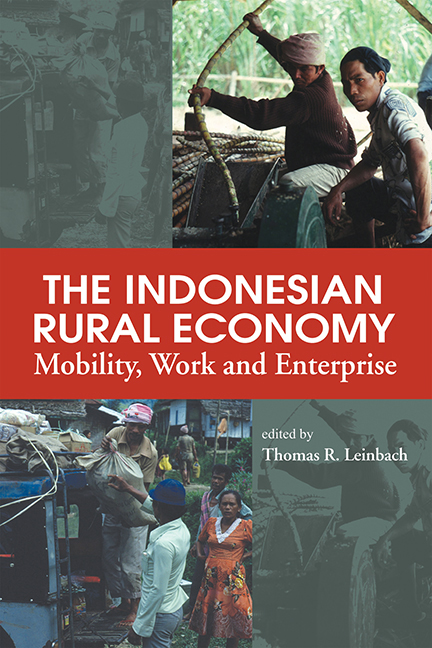Book contents
- Frontmatter
- Content
- List of Tables
- List of Figures
- Contributors
- Acknowledgements
- Glossary
- Foreword
- Part I The Development Context
- Chapter 1 The Indonesian Rural Economy
- Chapter 2 The Changing Importance of Off-Farm Income for Agricultural Households in Indonesia
- Chapter 3 The Economic Policy Environment for Small Rural Enterprises in Indonesia
- Chapter 4 The Contribution of Household and Small Manufacturing Establishments to the Rural Economy
- Part II Entrepreneurship, Gender and Mobility Issues
- Part III Indonesia's Rural Non-Farm Economy: Case Studies and Policy Development
- Index
Chapter 4 - The Contribution of Household and Small Manufacturing Establishments to the Rural Economy
from Part I - The Development Context
Published online by Cambridge University Press: 21 October 2015
- Frontmatter
- Content
- List of Tables
- List of Figures
- Contributors
- Acknowledgements
- Glossary
- Foreword
- Part I The Development Context
- Chapter 1 The Indonesian Rural Economy
- Chapter 2 The Changing Importance of Off-Farm Income for Agricultural Households in Indonesia
- Chapter 3 The Economic Policy Environment for Small Rural Enterprises in Indonesia
- Chapter 4 The Contribution of Household and Small Manufacturing Establishments to the Rural Economy
- Part II Entrepreneurship, Gender and Mobility Issues
- Part III Indonesia's Rural Non-Farm Economy: Case Studies and Policy Development
- Index
Summary
Introduction
The development of labour-intensive manufacturing is very important in Indonesia, especially in densely populated Java, as a means of increasing incomes partly through the productive utilization of the large amounts of available unemployed labour. In densely populated rural areas, manufacturing and agriculture can be considered the leading sectors, followed by the development of wholesale and retail trade and services. In contrast with large and to a lesser extent medium sized manufacturing enterprises that tend to be located in urban areas, household/cottage manufacturing establishments (HMEs) as well as small manufacturing establishments (SMEs) are widely dispersed in rural areas. Therefore in rural areas the HMEs and SMEs are especially important in increasing incomes. The per capita incomes normally generated from HMEs are low. The vast majority of these enterprises fail, and those that do not realize little growth. Thus, they are more important in poverty alleviation than in contributing to economic growth. As a last resort, many individuals who are unable to find paid jobs establish HMEs and other household enterprises as a survival activity (Liedholm and Mead 1999). SMEs are important to the survival of the people because they create many jobs, and to economic growth because over time, many of them increase in size generating more and more income.
The emphasis in this chapter is on the nature and importance of the development of the household manufacturing industries (HMIs) and small manufacturing industries (SMIs) from 1986 to 1996 and from 1996 to 2000. The latter period encompasses the economic crisis in Indonesia. To date little analysis has been done on the HMIs at the two-digit industry level—as opposed to case studies of particular industries in particular localities, and of the comparison of the HMIs with the SMIs. This chapter also initiates some analysis on the impact of the crisis on these industries. Finally some recommendations are made specifically focusing on the HMIs, without duplicating the policy recommendations already made by many studies about facilitating the development of small and medium manufacturing industries, (e.g., see Center for Economic and Social Studies and Asia Foundation 1999, International Labour Organization 1999, Poot et al. 1990, Hill 2001, Rice et al. 2002, Asian Development Bank SME Development TA 2001/2002, Urata 2000, Berry et al. 2001, and van Dierman 2000.)
- Type
- Chapter
- Information
- The Indonesian Rural EconomyMobility, Work and Enterprise, pp. 61 - 100Publisher: ISEAS–Yusof Ishak InstitutePrint publication year: 2003

